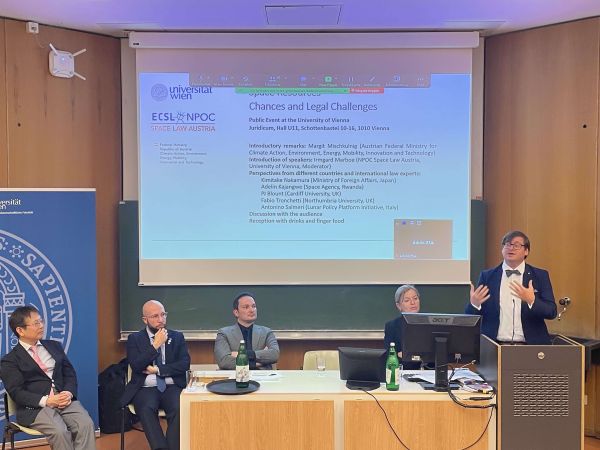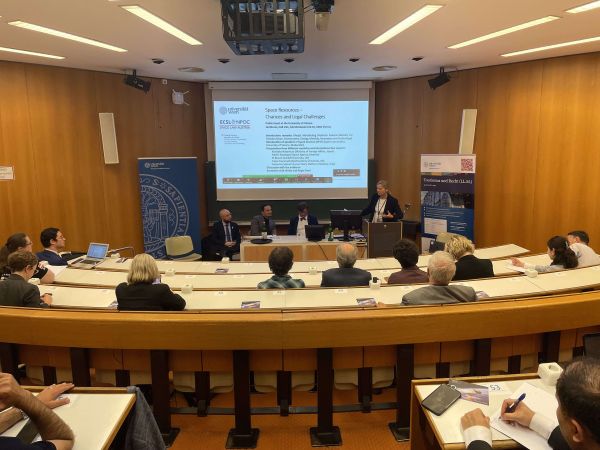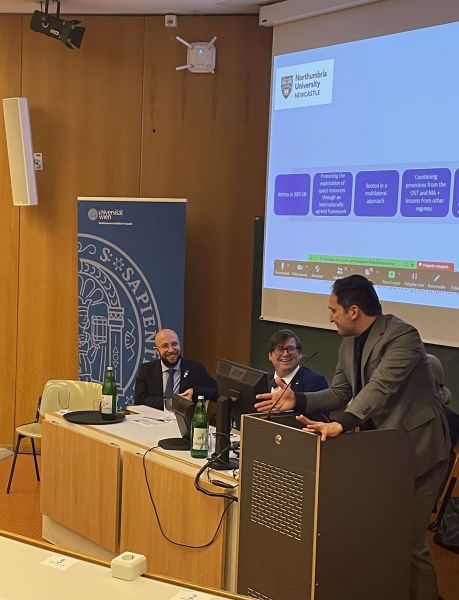Space Resources – Chances and Legal Challenges
Organizer
- National Point of Contact for Space Law Austria (NPOC Space Law Austria) of the European Centre for Space Law (ECSL) at the University of Vienna
- Federal Ministry for Climate Action, Environment, Energy, Mobility, Innovation and Technology
Documentation
As the exploration and utilization of space resources has become a key area of interest for the scientific and business communities, the event featured a panel of experts from space agencies, government, academia, and civil society who engaged in a discussion to explore the opportunities and legal complexities associated with space exploration and resource utilization. The discussion took place at the margins of the UNCOPUOS June session and was organised by the NPOC Space Law in cooperation with the Austrian Federal Ministry for Climate Action.
Relevant international agreements, property rights, environmental concerns, and more were addressed by the panel of speakers moderated by Professor Irmgard Marboe. After welcoming and introductory remarks by Margit Mischkulnig from the Austrian Federal Ministry for Climate Action, the panelists shared expertise and different viewpoints on some of the controversial issues. Kimitake Nakamura (Ministry of Foreign Affairs, Japan) started off, followed by Adelin Kajangwe (Space Agency, Rwanda) - presenting remotely. PJ Blount (Cardiff University, UK) and Fabio Tronchetti (Northumbria University, UK) laid out approaches from political and legal perspectives, rounded up by a civil society perspective presented by Antonino Salmeri (Lunar Policy Platform Initiative, Italy).
The audience got to witness, amongst others, a lively debate on the Artemis Accords, initiated by the United States and meanwhile signed by more than 20 space agencies. Their set of principles to govern the civil exploration and use of outer space in achieving a sustainable and robust presence on the Moon is meant also for preparing the conduct of a human mission to Mars. The Accords are not legally binding, but they represent a commitment by signatories to cooperate and comply with the 10 principles they contain, including on the extraction and utilization of space resources on the Moon, Mars, and asteroids.
Not only did the panelists talk about their personal experience and involvement with the question of space resources and the Artemis Accords, they also shared their thoughts on existing international space law, including the Moon Agreement. An interesting debate, containing a myriad of different views and approaches, started to commence and also allowed for highly appreciated audience participation.
Finally, the question arose, how the Artemis Accords relate to UNCOPUOS and a possible legal framework for future international cooperation in outer space exploration. While some panelists pointed out that the Accords presented an effort to regulate outside the realm of UNCOPUOS´s authority, others found this to be an unproblematic circumstance, since this didn't necessarily present a new development.
The event highly benefited from the great chemistry between the panelists, who always made sure to keep the debate respectful, vibrant, lively and to share the occasional laugh with the audience. This positive atmosphere was continued later on, as panelists and attendees whiled away the evening with some drinks.
The NPOC Space Law wants to thank all event participants and is looking forward to the next NPOC event!
Content Description
The event will include a discussion on the Artemis Accords, a set of principles signed by several space agencies to govern the civil exploration and use of outer space in achieving a sustainable and robust presence on the Moon while preparing to conduct a human mission to Mars. The Accords are not legally binding, but they represent a commitment by signatories to cooperate and comply with the 10 principles they contain, including on the extraction and utilization of sp ace resources on the Moon, Mars, and asteroids.
The panel of experts will provide perspectives on the Artemis Accords, their relationship to other international agreements, such as the Moon Agreement, and views of developing countries.
Reviews to the previous events:
Program
- 18:30 Welcome with drinks
- 19:00 Introductory remarks:
-
- Margit Mischkulnig (Austrian Federal Ministry for Climate Action, Environment, Energy, Mobility, Innovation and Technology)
- 19:05 Introduction of speakers:
- Irmgard Marboe (NPOC Space Law Austria, University of Vienna, Moderator)
- 19:15 Perspectives from different countries and international law experts:
-
- Kimitake Nakamura (Ministry of Foreign Affairs, Japan)
- Dovile Matuleviciute (Space Agency, Luxembourg)
- Nadia Karemera (Space Agency, Rwanda)
- PJ Blount (Cardiff University, UK)
- Fabio Tronchetti (Northumbria University, UK)
- Antonino Salmeri (Lunar Policy Platform Initiative, Italy)
- 20:30 Discussion with the audience
- 21:00 Reception with drinks and finger food
- 21:45 End of event
Downloads
Target Audience
Public event
Contact Address
Space Resources – Chances and Legal Challenges
E-Mail: npoc.space.law@univie.ac.at



